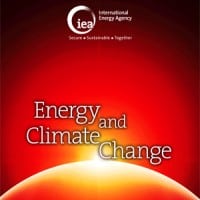Energy related carbon emissions could peak as early as 2020 if five key policy measures are implemented by governments says the International Energy Agency – including the phasing out of fossil fuel subsidies.
The IEA’s “Bridge Scenario” in the just-released World Energy Outlook Special Report on Energy and Climate Change report says peak emissions could be achieved by that year without detriment to the economic and development prospects.
The five measures are:
- Enhancing energy efficiency in the industry, buildings and transport sectors
- Minimizing use of least-efficient coal-fired power plants and banning construction of new ones
- Boosting investment in renewables from USD $270 billion in 2014 to $400 billion in 2030
- Gradual phase out of fossil-fuel subsidies to consumers by 2030
- Reducing methane emissions in oil and gas production
The impact of fossil fuel subsidies is having a significant effect on the climate change battle, amounting to an incentive to pollute worth $US115 per tonne of carbon-dioxide.
A working paper published last month by the International Monetary Fund (IMF) estimates post tax energy subsidies reached USD $4.9 trillion globally in 2013 and are projected to reach $5.3 trillion (AUD $6.73tn) in 2015. Renewable energy subsidies are a comparatively meager $120bn a year
While the IEA believes electricity from renewable sources such as solar and wind power will be the leading source of electricity by 2030, inefficient coal-fired power generation may reduce only slightly. This means ambitious pledges by leading nations are needed and the energy sector must be at the forefront of positive change.
“It is clear that the energy sector must play a critical role if efforts to reduce emissions are to succeed,” said IEA Executive Director Maria van der Hoeven. “While we see growing consensus among countries that it is time to act, we must ensure that the steps taken are adequate and that the commitments made are kept.”
The IEA was initially dedicated to responding to physical disruptions in the supply of oil in the wake of the 1973–1974 oil crisis. In the past, it had been criticized of underestimating the role of renewable energy; however, its attitudes towards renewables has changed greatly in the last few years.
The World Energy Outlook Special Report on Energy and Climate Change can be viewed in full here (PDF).












































